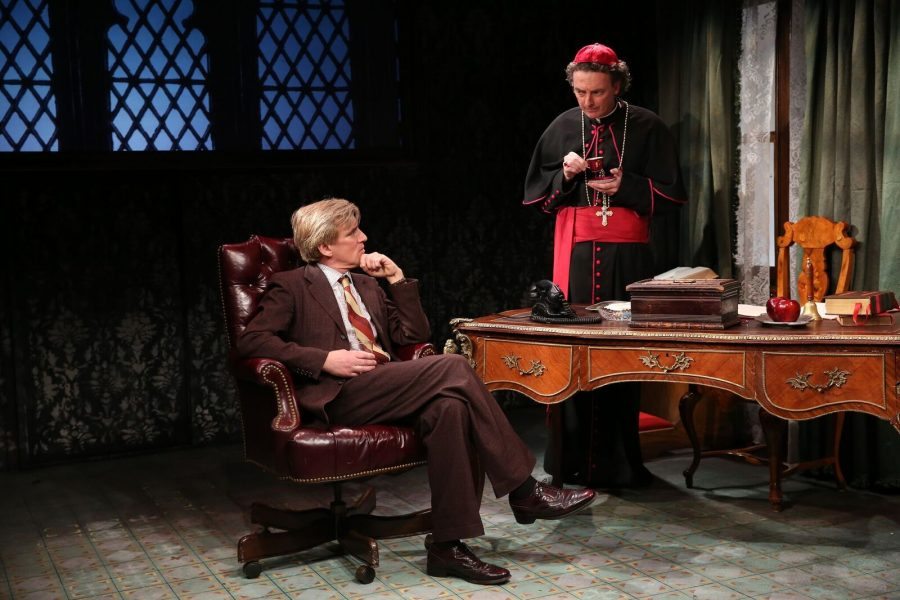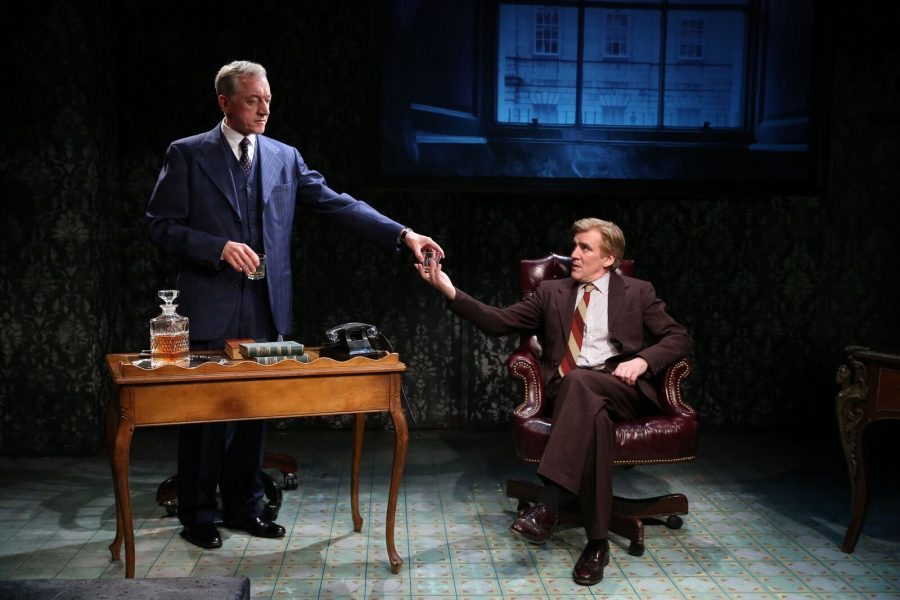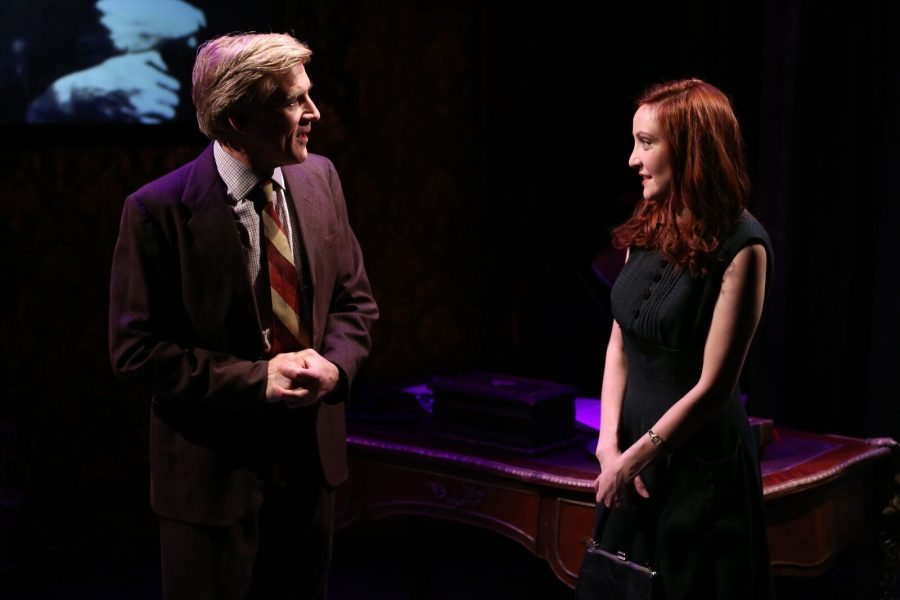

Larry Kirwan’s new play, Rebel in the Soul, directed by Charlotte Moore, looks at Dr. Noël Browne’s health reform mission, which ultimately brought down the First Inter-Party Government in Ireland. Browne intended to rid Ireland of tuberculosis, the widespread malady that he too suffered from. In 1948, at the age of 33 and with little political experience, Browne was elected to Irish Parliament, becoming Minister for Health that same year. Ambitious and determined, he pushed for the Mother and Child Scheme, a plan to provide free healthcare for non-means-tested women and children up to the age of 16. His agenda, however, conflicted with that of Dr. John McQuaid, Archbishop of Dublin, and former IRA chief (later a founding member of Amnesty International) and the leader of his own Clann na Poblachta party, Sean McBride. With Planned Parenthood cutbacks in the US and a proposed referendum on abortion later this year in Ireland, Rebel in the Soul’s subject matter is certainly topical. Here, actor and Irish Repertory Theatre regular Patrick Fitzgerald discusses his portrayal of Browne - the man they called “Flash”, and the play’s relevance to current health legislation.
What did you know of Dr. Noël Browne prior to landing the role?
You knew he was there and he was something and people had opinions. He was kind of in the country’s subconscious. I remember my father loving him and hating him and cursing him and praising him. He was that sort of figure. So, I knew about him and I knew that he had a crusade against tuberculosis before the Mother and Child thing and I knew that he’d butted heads with the Catholic Church. But I didn’t know any of the details. I didn’t know any of his background. I didn’t know what brought him down eventually.
I’m surprised he kept his Irish accent as a good bit of his formative years were spent in England.
Yeah, but then again, listen to you or me. I’ve been here for God knows…most of my life now. And you were like, “Are you from Cork?” You know? He only spent time in England from ten to eighteen. And then he went back and he was in Trinity. And then he went back and worked there again and spent some time in a hospital there. So, I wasn’t surprised at that. I was surprised that he sounded so well spoken. But I guess his formative years were in English Catholic prep schools.
Little is known of Browne outside of Ireland and even in Ireland beyond a certain generation.
But they’ve all heard of him. I mean, even young people today, they’ll have all heard of him. He’d be a footnote in the history books, kind of like, “Ok, who’s he? Trouble maker!” And we all love the trouble makers.
How much or how little of your interpretation of him was based on like-for-like imitation?
I wouldn’t even do that if I was in Ireland. Because, I mean, I could, because, it’s quite a mouthful I have in this play. If you listen to Noël Brown he tttt…talks like that quite a bit and I could easily do that and you’d be sitting, waiting for the play to end, you know what I mean? I could throw that in but it’s not necessary when you’re playing a living or historical character to try and imitate them too much. Better to go for their essence of something.
Browne's career span and good fortune came in no small part from the generosity of benefactors who put a roof over his head in childhood and paid his way through Trinity College. Other than the TB he suffered from, would you say that his compassion as a politician was rooted in the kindness and opportunities therein that effectively saved his young life?
Yeah, I would think so and I would think that the cruelty that he witnessed and the charity that he received had a huge effect on his view of life and his goals in life. Because he really was on a mission. His nickname was Flash. Which is kind of hilarious in the 1950s being called Flash, but I guess they had Flash Gordon back then. He’s not too far back in history for us but that was his nickname, Flash, because he got everything done so quickly and he just wasn’t taking any prisoners. He was the outsider. He didn’t have alliances or affiliations. He just had his goals and he was going to achieve them. And he did, I mean he eradicated tuberculosis from Ireland.

And he tried to follow the example of things that were going in Europe with health reform that seemed to be leading the way, the NHS (National Health Service) for one.
Yeah, but where have Ireland come on the whole Mother and Child Scheme, you know? They’ve just handed over their new maternity hospital to the Sisters of Charity to run...forever! And today, if you look at The Irish Times, you’ll see an article about…they call her Miss Y. I think she’s probably a Syrian refugee and was raped before she got to Ireland, and she was suicidal and begged them and begged them that she didn’t want to have this child because she feared that she was carrying the spawn of Satan. She was a very religious woman, she went on hunger strike, they force-fed her, the child was taken out of her by caesarean section. It’s just barbaric.
The 2012 death of Savita Halappanavar in Galway after being denied a termination has further fueled the urgency in the ongoing Irish abortion debate.
Yeah, it’s not an isolated incident. This is what happens when the Catholic Church…they control the institutions. They don’t let go of them. My niece has a child and she’s going to have to leave the place where she’s been living in Dublin for ten years because she’s got a little girl who’s coming to school age and she doesn’t want to say “Oh yeah, she’s a Catholic now just because she wants to go to school.” But she can’t get into the school unless she’s a Catholic. So she’s going to have to move. That’s how they hold onto power. They hold onto the institutions.
The church's standpoint differs from the majority of Irish people, the same people who by popular vote were the first country in the world to legalize gay marriage in 2015. And under the new administration here, where many ordinary people have turned into overnight activists, there's a feeling that we're moving backwards in many regards. As a native of Ireland and a resident of America, are you optimistic or otherwise about the progression of women's health needs being met either side of the Atlantic?
Well you are and you aren’t. I think it’s like…65% of people in this country would support single parent health care. That’s the bottom line. They’re not asked and they never will be, but they won’t get a chance to do that because the powers that be don’t want that. But that’s the people. They don’t vote anyway, most of them.
But are you optimistic about the change in Ireland?
Yeah, eventually, because the people are not….even the ones that are still bowing to the church, they don’t want them in charge.
Sean McBride is also a complicated character. A former IRA chief and later a human rights activist and Amnesty International founder. And yet he appeared to adhere to the notion that the fate of the Irish people was answerable to the Catholic Church. What are your views on the McBride/Browne relationship?
He sold out Browne.
Do you think that was personal?
No. It think it was all to do with his…he was a dyed-in-the-wool Republican, a 32 County Ireland is going to be heaven, all our problems will disappear, as long as we’ve got the 32 County Ireland. And he was running around the whole world trying to get support for that. He was willing to sell our neutrality by joining NATO. And he was trying to convince the Americans and he came close, and the Church would have supported him on that as well. He made a deal with the devil. I think he was quite progressive in his own way and would have welcomed the Mother and Child Scheme. It was just collateral damage for his greater goal which was a united Ireland. And I kind of fall in Browne’s camp there that the greater goal should be, look after the people that are here, don’t mind your Nationalist pipe dreams.

Browne’s story arc has him growing more unhinged with each setback. Do you think his doctor’s bedside manner was missing from his political career? He fell out with a lot of people.
Yeah, he did and then he nearly fell out with his wife as well, which would have been a disaster. She held him together and you know, he did resign then. And he still kept getting elected but he was kicked out of four different parties after. But at that stage, at least he had earned his little media frame, and when he said something, people took notice and the people heard. Even though he wasn’t getting laws enacted or changed, they listened.
What Browne was trying to achieve with the Mother and Child Scheme was phenomenal, but his fallings out with other members of parliament was so often about other issues. In your opinion, did his intense focus on the scheme put the blinkers on when it came to other political issues?
Yeah, but you can only do so much. Did he eliminate tuberculosis? No. That said, he was in the right place at the right time because these new miracle drugs had come about. He built sanatoriums all over the country and it really did work. The Mother and Child Scheme was not his scheme in the first place. That was the Fianna Fáil government.
The other interesting thing from that era was that he was poor the whole time because they didn’t pay them. It was another way of keeping the job for rich people, you know, don’t pay them. Before that, members of parliament, they had all been elected by landowners. So this was different but he got paid pittance. Later on in life, politicians started getting paid very well in Ireland, like too well in Ireland. Jobs for life, pensions and this, that and the other. Back then he was really having a tough time of making a go of it with his wife and family.
Do you think his nature changed over time from always being up against it?
Yeah, I think he chilled out.
I read that people seemed to think he became embittered by his experiences.
I’m not sure about that. I see interviews with him later on and he doesn’t seem that embittered. You listen to Robert Ballagh, the artist on his relationship with him and how funny he was and how nice and calm, living in Connemara, watching the sea (laughs). I think a lot of people said that because he would not play party politics. The Labour Party now are considered like New Labour in England. They were the same back then. They were part of the problem. They were making the promises…and he was having none of it. So, who were the people that are saying he was embittered? The Labour Party, Fianna Fáil.
The opposition.
The opposition. And he was just kind of an independent voice and he didn’t care about that. Like I said, he was kicked out of at least four parties.
In the play, John Keating's portrayal of Dr. John Charles McQuaid (Archbishop of Dublin) is markedly passive aggressive. What is your take on McQuaid's resistance to Browne's intended legislation? Were his views steeped in his own sense of morality or an unyielding power play?
Unyielding power play. He didn’t object to the British NHS in Belfast. They’ve no problem there. The Catholic Church had no objections because they couldn’t have changed it. The English government weren’t about to say, “Oh no, the Catholic Church are opposing us, what are we going to do?” No. So they shut up and did what they were told and there was no problem with that. It was just holding onto power by whichever means they could.
You've quite the cough in Rebel in the Soul. Usually, when there's a hint of a cough in a play or a film, the outlook is bleak. But Dr. Browne's hacking away seems only to bolster his determination. How did you prepare for the physicality of Browne's malady?
I don’t know. I smoked for 40 years (laughs), I dunno what to say to that. I’ve seen people with bad coughs. I’ve known people with tuberculosis, people in Ireland. My sister had tuberculosis. They thought she got it in Calcutta, but she didn’t. She got it in New Zealand and three years later, the huge ranch that she had stayed on in New Zealand, the owner of that ranch got a big galloping tuberculosis and was dead within six weeks or something like that.
Black 47 founder Larry Kirwan wrote this play. There's a scene in which Browne meets his wife and the two of them dance to music. In your opinion, given Kirwan's background in a political trad/rock band, how do the musical parts, no matter how brief, inform the tone and narrative of the play?
I think he’s done a very good job of capturing something from the era in the simplicity of the lyric. And it’s very nice to dance to. I’m not a musical kind of guy myself.
What are you hoping might linger the most in the minds of your audience after seeing Rebel in the Soul?
I guess the outsider just banging on and getting things done. There’s always the danger you see that, we’re in the theater world and you’re preaching to the converted, you know, and who wants to do that? But if enough people go and preach, it might change some people’s minds about things, it might not, I dunno.
You've a solid resume with the Irish Rep; are there any future collaborations planned?
There’s a piece that I have from Finnegans Wake. We’ll see what might happen with that. I know our illustrious leader, Charlotte Moore, who I love to death is very interested. It’s a 45-minute monologue. It’s a woman’s voice so there’ll be fishnet stockings and high heels (laughs). Maybe not. But that’s a possibility. I’ve done a lot of stuff here. They produced my own play, Gibraltar, which was an adaptation of Joyce’s Ulysses, and that ran here. So yeah, there’ll be something.
What brought you here in the first place?
All my friends were going to London and I didn’t like the sound of that at all. I was like, feck that, I’m going to New York, bye! (laughs) It’s been real.
There’s a great sense of optimism here.
Anything can happen, anything can happen. But New York too is like another country. It was New York, I was coming to New York and I stayed in New York. We were all asked to leave the country basically. When we graduated from university it was like, bye, seeya! So, everybody was going to London and I was like, no, I don’t think so, I’m going to New York. I’d always wanted to go to New York, so I did. I knew nobody. I didn’t know what I was going to do when I got here. I just went.